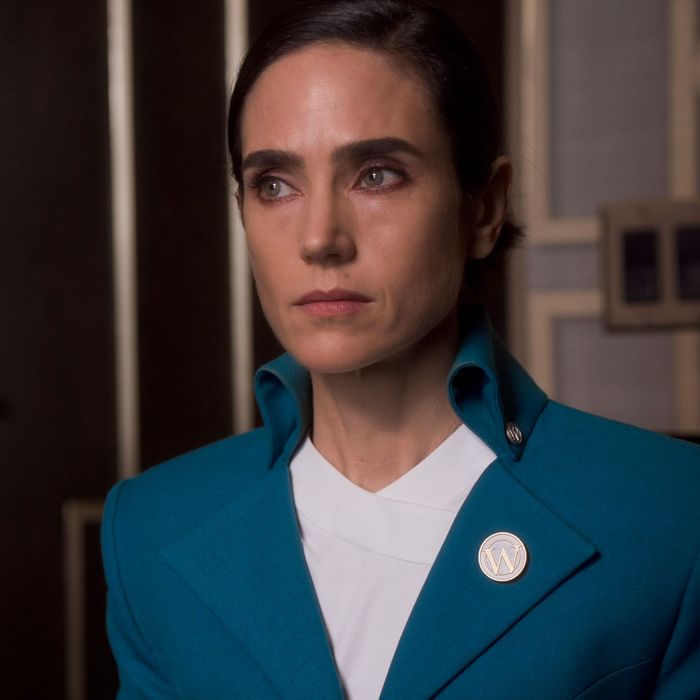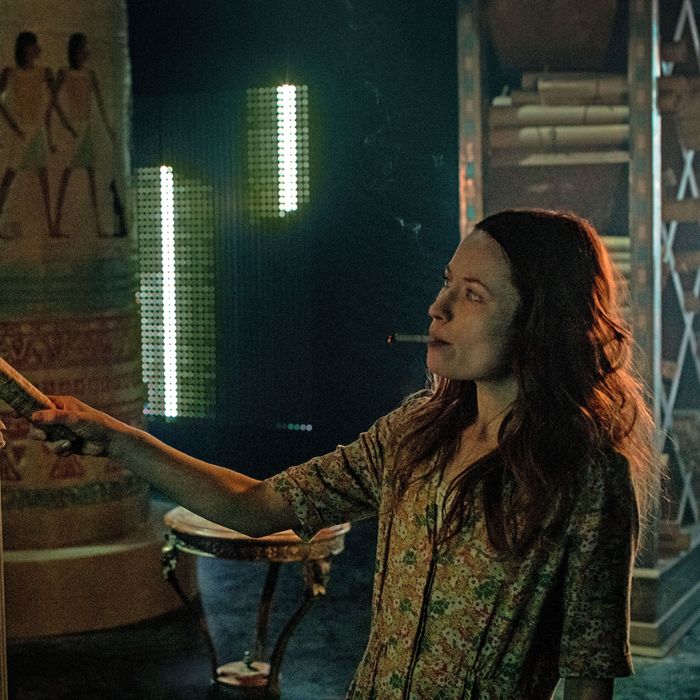https://www.vulture.com/article/snowpiercer-season-1-episode-4-recap-without-their-maker.html
Snowpiercer S1 Ep 4: Without Their Maker
Snowpiercer Recap: Sake Bomb
By Hillary Kelly

Photo: TNT
Snowpiercer isn’t great TV. It’s entertaining as hell, and sometimes puzzling, and often a weird, steroidal, accidentally campy version of the film and graphic novel it’s based on, but nobody is hailing it as Emmy-bait. And yet the in-your-face structure undergirding the entire enterprise — this giant rolling metaphor for our class- and race-partitioned society — may be the best bit about it all. This episode, not even halfway into the season, essentially wrapped up the murder mystery I expected to play out for six more hours onscreen. What’s left is the real meat of the show, an entirely unsubtle message, so loud that the people wayyyyyy in the back can definitely hear it: It’s time for an uprising. Don’t just eat the rich, slice them open like a long strip of glistening sashimi and then delicately chew them up with a glass of sake as a chaser.
Admittedly, it’s satisfying this week to have an outlet for this kind of righteous rage, even if it’s muddled up in a seemingly pointless murder plot. So first let’s work our way through that.
Nikki Genêt is dead as we expected, with a slit throat and all the accompanying sprayed blood. We’ve seen the killer’s face, but his identity is still a mystery to Layton and Melanie, so the investigation must go on. Luckily, the fracas that broke out during Fight Night necessitated the shutdown of all the “borders” in the train, so if a first-class passenger is the killer, as Terence explained to Layton last episode, they at first believe he’s most likely in the first-class car.
The plan is to sweep the train, from the Tail forward, and although Ruth resists (it would be very “unpopular” to wake fancy people up in the middle of the night), Melanie eventually agrees that Mr. Wilford would want it done. In the midst of the first-class middle-of-the-night fruit-and-eggs police shakedown, LJ admits that Eric, her bodyguard and the man we all know is the killer, didn’t come home last night. A quick turnover of his quarters yields a j-hook, a metal bar that beekeepers use to lift the frames that house hives. Whether or not he is supposed to have used it to chop off body parts is unclear, but if he found the j-hook in the discarded hives wrapped up in third-class storage, they surmise, he may be there now.
Till and Oz give chase, first through a crowded third-class car and then, after Eric grabs Jinju and holds her hostage, down into the subtrain. A classic standoff ensues, Eric stupidly shoots the side of the train (for unclear reasons), and he’s then taken down. By axes. Damn.
Back in the Folgers’ first-class carriage, Layton wiggles information out of a snitty and over-confident LJ. First, that she and Eric have had a little fling going on, despite the fact that she was a child when he first came to work for her family. And secondly, that he killed at LJ’s request. That’s why the sawed-off limbs seemed as if they came from a different crime scene than the chopped-off dicks. Eric took off arms and legs to hide the dead. LJ took off penises just, as Layton says, “to feel something.” Neat and tidy, it’s all wrapped up. Eric dies. LJ goes into a cell.
But the backdrop this half-baked murder plot plays out against is the the real beef of Snowpiercer, the uprising of the demoralized against the morally bankrupt.
Think of it this way: In its very last gasps of breath, as an unprecedented cold swept the globe and made the Earth entirely uninhabitable, one of the last things humanity did was to make sure everyone knew their proper place in the post-apocalypse. It sold tickets to salvation. It inserted chips in people’s arms to control where they go. If you wanted to survive but didn’t have thousands stashed away to pay your fare, well, they’d just murder you. There were riots as the shivering masses hoped for survival. That’s part of the reason I appreciate how unsubtle Snowpiercer is about the disparity in stakes between the have-alls and the have-to-bow-downs. Because as you’ve noticed this week, if you have eyes and care to open them, the world is just as unsubtle in its unfiltered violence and oppression. Sure, Snowpiercer is a sci-fi rendering, but its origins are all real-world.
The long, tastefully lit hallway that leads to the first-class dining car is lined with art: van Gogh’s Sunflowers, Vermeer’s Girl With a Pearl Earring. The kinds of immediately recognizable pieces that tourists buy in postcard form, that people like the Folgers would probably say they “acquired” to save from destruction, but which we can better describe as looted from humanity so the greedy rich can keep it entirely for themselves. Their carriage itself looks like a Ritz Carlton suite, all textured beige drapery and a curving staircase. The Folgers have as much space (if not more owing to the upstairs) for four people as the Tail has for a hundred-plus.
As Layton questions LJ (which of course stands for Lila Junior, I am hoping in a nod to the greatest fictive snob of all-time, Sweet Valley High’s Lila Fowler), she turns out every trick in the Demanding Rich Girl playbook. She alternates between banal cruelty (opening the curtains to remind Layton of her ready access to sunlight) and coquettish suggestion (dancing around like a suggestive little nymphet). The dynamics couldn’t be more clear: a filthy-rich teenage white girl feels so sure of her power over a black Tailie that she spills her guts about being a murderer. She thinks the raw silk pillows that cushion her parents’ couch and the icy crystals that hang from their chandeliers are proof of her invincibility. She tries to foist Layton over a barrel, offering him guns for his revolution in exchange for silence about her crimes. She’s dumb enough to believe he’d walk into that agreement.
Melanie, too, has a convoluted sense of power. We know, thanks to some rather conspicuous costuming choices, that she went to MIT and studied engineering at Yale. She’s the head of hospitality for Wilford Industries not just because of her regal bearing and ability to soothe the tempers of first-class passengers incensed about overcooked prime rib, but due to a combination of her deportment, her hard skills, and some special relationship with Mr. Wilford, whether he is dead, exiled, or never existed at all. She was also, she suddenly reveals this episode, “born on a dirt farm in eastern PA,” and she encourages Layton to be the first-class passengers’ “worst nightmare from the tail.” She also is, essentially, Mr. Wilford, the voice of the train and the voice insisting that “balance,” aka black jello slime for the Tail and custom-made omelettes for first-class, must prevail.
It’s really no surprise that she assigns Layton to The Drawers after slipping him a roofied sake. He’s served his purpose and restored order. He also, she tells him like a classic villain, “knows too much.” Too much about how the train works, for sure, but specifically that he knows there is no wizard behind the curtain.
What she doesn’t know is that Josie has infiltrated the train, set up a line of communication with an apprenticed Tailie, and now has access, rage, and that little slip of paper letting her know that Layton is missing. And that the revolution is about to begin.



